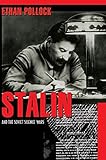Stalin and the Soviet Science Wars / Ethan Pollock.
Material type: TextPublisher: Princeton, NJ : Princeton University Press, [2021]Copyright date: ©2006Description: 1 online resource (288 p.) : 15 halftonesContent type:
TextPublisher: Princeton, NJ : Princeton University Press, [2021]Copyright date: ©2006Description: 1 online resource (288 p.) : 15 halftonesContent type: - 9781400843756
- Communism and science -- Soviet Union
- Science and state -- Soviet Union
- HISTORY / Russia & the Former Soviet Union
- Academy of Medical Sciences
- Armenian scholars
- Bekhterev Institute
- Biriukov, Dmitrii Andreevich
- Cold War
- Cultural Revolution
- Engels, Friedrich
- German philosophy
- Gorbachev, Mikhail
- Herald of Ancient History
- Honor Courts
- House of Scientists
- Krementsov, Nikolai
- Machism
- Michurinism
- Ministry of Education
- Orgburo (Party committee)
- Politburo
- Questions of Linguistics
- Science Section (Agitprop)
- Soviet Ethnography
- Suslov, Mikhail
- Vucinich, Alexander
- Western influence
- agriculture
- anti-Pavlovians
- anticosmopolitanism
- biology discussion
- capitalism
- centralized planning
- collective farms
- cosmopolitanism
- dogmatism
- economic laws
- economists
- idealism
- linguistics
- materialism
- national identity
- patriotism, Soviet
- philosophy of science
- physics teaching
- propaganda
- quantum mechanics
- scientific discussions
- short courses
- transition to communism
- uncertainty principle
- university physicists
- wages under socialism
- zhdanovshchina
- 338.947/0609044 22
- HX541
- HX541
- online - DeGruyter
| Item type | Current library | Call number | URL | Status | Notes | Barcode | |
|---|---|---|---|---|---|---|---|
 eBook
eBook
|
Biblioteca "Angelicum" Pont. Univ. S.Tommaso d'Aquino Nuvola online | online - DeGruyter (Browse shelf(Opens below)) | Online access | Not for loan (Accesso limitato) | Accesso per gli utenti autorizzati / Access for authorized users | (dgr)9781400843756 |
Frontmatter -- CONTENTS -- FIGURES -- CHAPTER 1 INTRODUCTION Stalin, Science, and Politics after the Second World War -- CHAPTER 2 “A MARXIST SHOULD NOT WRITE LIKE THAT” The Crisis on the “Philosophical Front” -- CHAPTER 3 “THE FUTURE BELONGS TO MICHURIN” The Agricultural Academy Session of 1948 -- CHAPTER 4 “WE CAN ALWAYS SHOOT THEM LATER” Physics, Politics, and the Atomic Bomb -- CHAPTER 5 “A BATTLE OF OPINIONS” Stalin Intervenes in Linguistics -- CHAPTER 6 “ATTACK THE DETRACTORS WITH CERTAINTY OF TOTAL SUCCESS” The Pavlov Session of 1950 -- CHAPTER 7 “EVERYONE IS WAITING” Stalin and the Economic Problems of Communism -- CHAPTER 8 CONCLUSION Science and the Fate of the Soviet System -- NOTES -- BIOGRAPHICAL NOTES -- ACKNOWLEDGMENTS -- INDEX
restricted access online access with authorization star
http://purl.org/coar/access_right/c_16ec
Between 1945 and 1953, while the Soviet Union confronted postwar reconstruction and Cold War crises, its unchallenged leader Joseph Stalin carved out time to study scientific disputes and dictate academic solutions. He spearheaded a discussion of "scientific" Marxist-Leninist philosophy, edited reports on genetics and physiology, adjudicated controversies about modern physics, and wrote essays on linguistics and political economy. Historians have been tempted to dismiss all this as the megalomaniacal ravings of a dying dictator. But in Stalin and the Soviet Science Wars, Ethan Pollock draws on thousands of previously unexplored archival documents to demonstrate that Stalin was in fact determined to show how scientific truth and Party doctrine reinforced one another. Socialism was supposed to be scientific, and science ideologically correct, and Stalin ostensibly embodied the perfect symbiosis between power and knowledge. Focusing on six major postwar debates in the Soviet scientific community, this elegantly written book shows that Stalin's forays into scholarship can be understood only within the context of international tensions, institutional conflicts, and the growing uncertainty about the proper relationship between scientific knowledge and Party-dictated truths. The nature of Stalin's interventions makes clear that more was at stake than high politics: these science wars were about asserting that the Party was rational and modern, and about codifying the Soviet worldview in a battle for the hearts and minds of people around the globe during the early Cold War. Ultimately, however, the effort to develop a scientific basis for Soviet ideology undermined the system's legitimacy.
Mode of access: Internet via World Wide Web.
In English.
Description based on online resource; title from PDF title page (publisher's Web site, viewed 01. Dez 2022)


